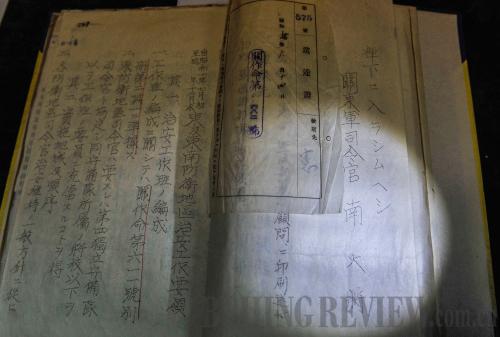Pivot to peace
- By Josef Gregory Mahoney
 0 Comment(s)
0 Comment(s) Print
Print E-mail Beijing Review, April 4, 2014
E-mail Beijing Review, April 4, 2014
|
|
|
A collection of documents containing evidence of Japan's war crimes in China during the 1930s to 40s are displayed by the provincial archives of northeast China's Jilin Province. [Xinhua] |
Among the certainties of history, there is the case of Iwane Matsu, the Japanese general held responsible for the Rape of Nanjing and hanged as a Class-A war criminal in 1948. But among the less certain narratives, the following has been recorded: It is said that after the Rape, he retreated to his hometown, ashamed. He helped erect a large statue of Kannon, the Buddhist goddess of mercy, facing Nanjing.
With tensions in East Asia related to longstanding territorial and wartime injustice claims, Europe, and particularly Germany, it is said, offer positive historical examples of accepting responsibility for crimes committed, the restoration of a lasting peace, and in time, the emergence of increasing political and economic integration in the form of the EU. The suggested subtext is that Japan should learn Germany's lesson. It is not a new idea, but it is one that can be considered anew, particularly in light of ongoing developments and the fact that this year marks the 100th anniversary of the start of World War I (WWI).
The centennial has been on the minds of many Europeans of late. I recently spent two months in Germany as a visiting scholar and noticed the various books, magazines and other forms of media reflecting on the war. It was, after all, a catastrophe that helped spawn future catastrophes, including World War II (WWII) and the Cold War. The scars of those encounters are still present in German memory, and perhaps more so than elsewhere. Although there have been major and arguably successful efforts to redevelop the formerly desolate areas surrounding the Berlin Wall since its fall, the physical traces remain, whether as empty spaces that seem perilously illogical or through various memorials erected to recall, precisely, what should not be forgotten. Of course, German reunification began in 1990, which means it's a living memory for most. With that in mind, there are many who are still alive in China today with either first or secondhand knowledge of Japanese atrocities. For many of those, no apology is sufficient, but the belief that one has not been truly offered and sustained remains a major aggravation.
But should we compare Germany and Japan, these two co-belligerents of WWII who likewise have a connection from WWI, when the German concession of Shandong Province was passed to Japanese control during the Treaty of Versailles? It is not proper to recall the Treaty insomuch as it set the stage in part for the emergence of Nazism and simultaneously provided Japan another foothold on the Chinese mainland? Because of deep historical linkages, such comparing of Germany and Japan is unavoidable; but one must reflect carefully on the sorts of lessons might be drawn when doing so. First, however, it is necessary to answer a number of Western pundits who have taken advantage of WWI's centennial to promote grossly ahistorical comparisons between the past and present. The most egregious among these is the assertion that the world today is on the precipice of another world war, with conditions recalling those in the run-up to WWI. In particular, they point the finger at Asia, at China's rise, as well as various treaties existing between the United States, Japan, South Korea, and China's Taiwan.







Go to Forum >>0 Comment(s)